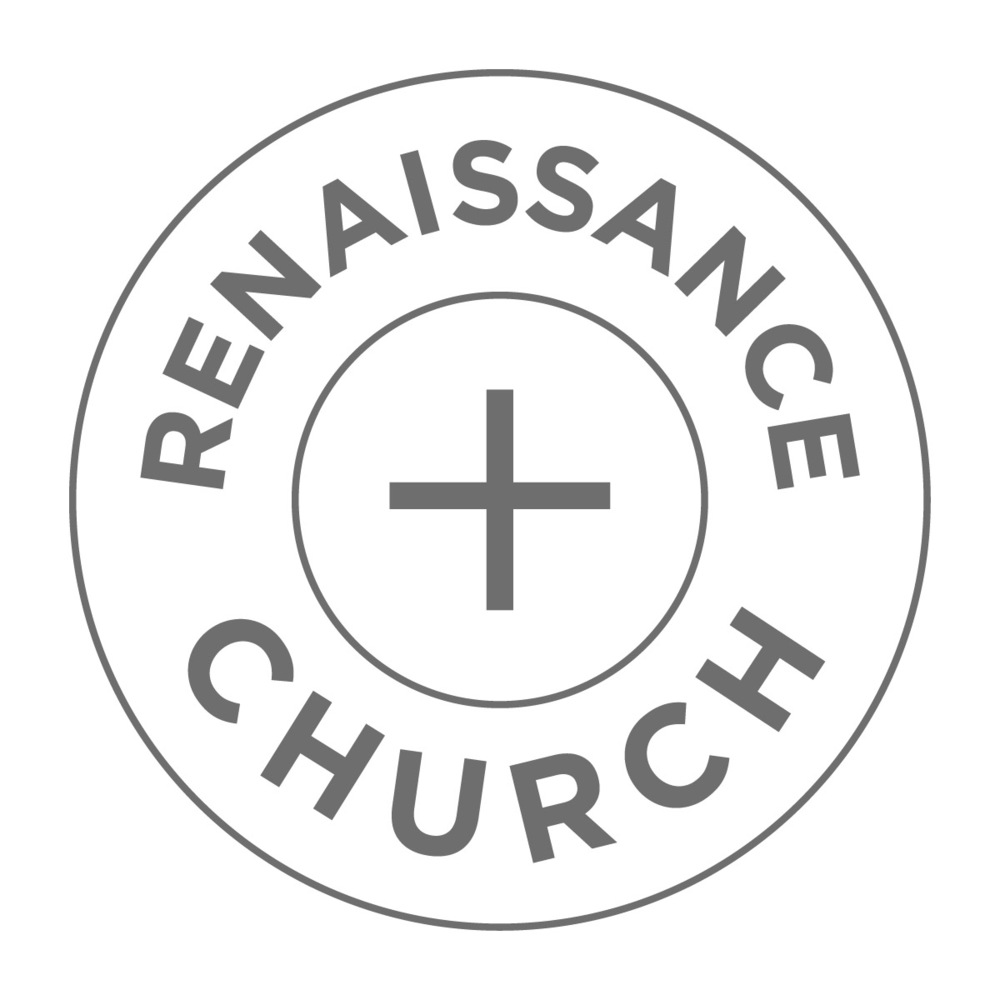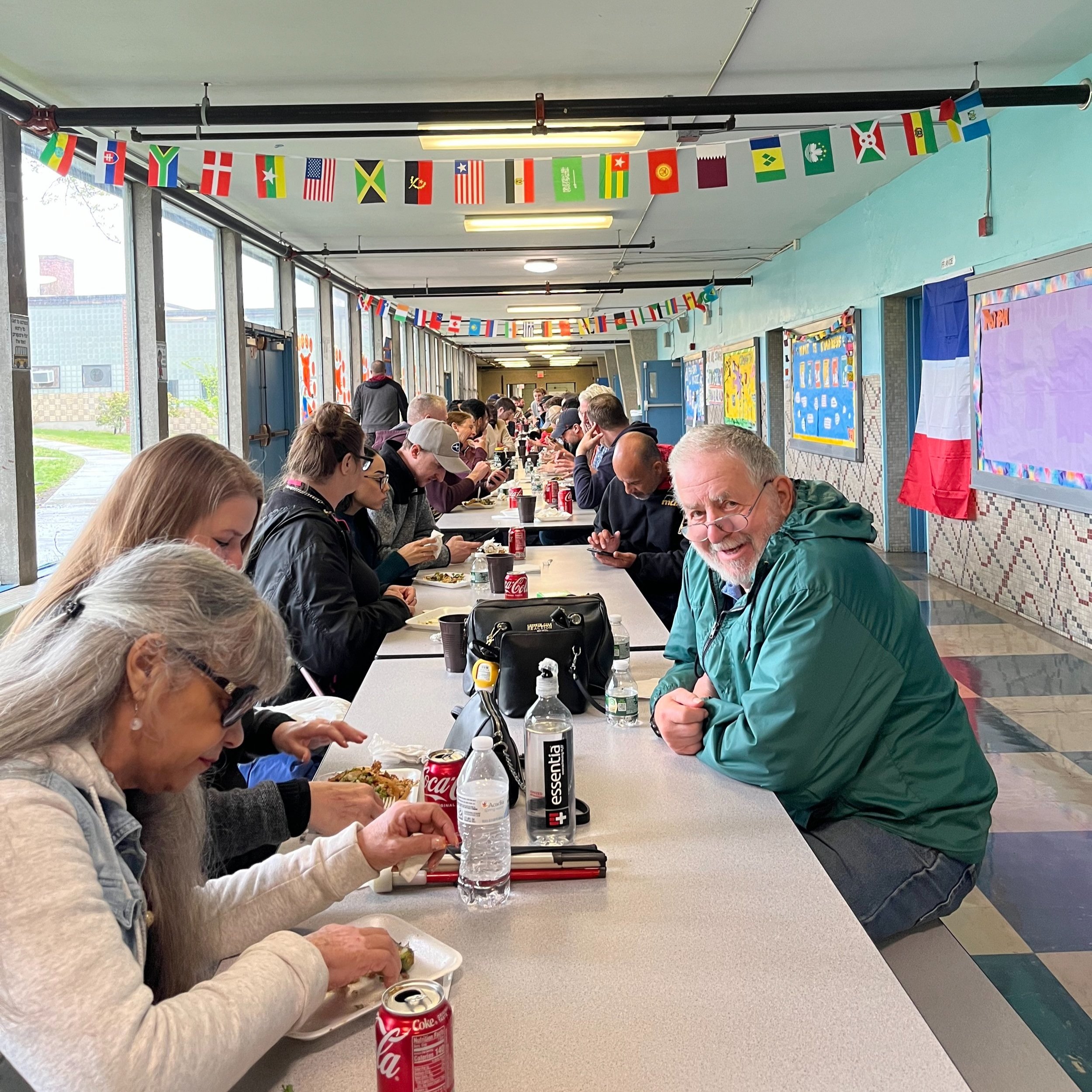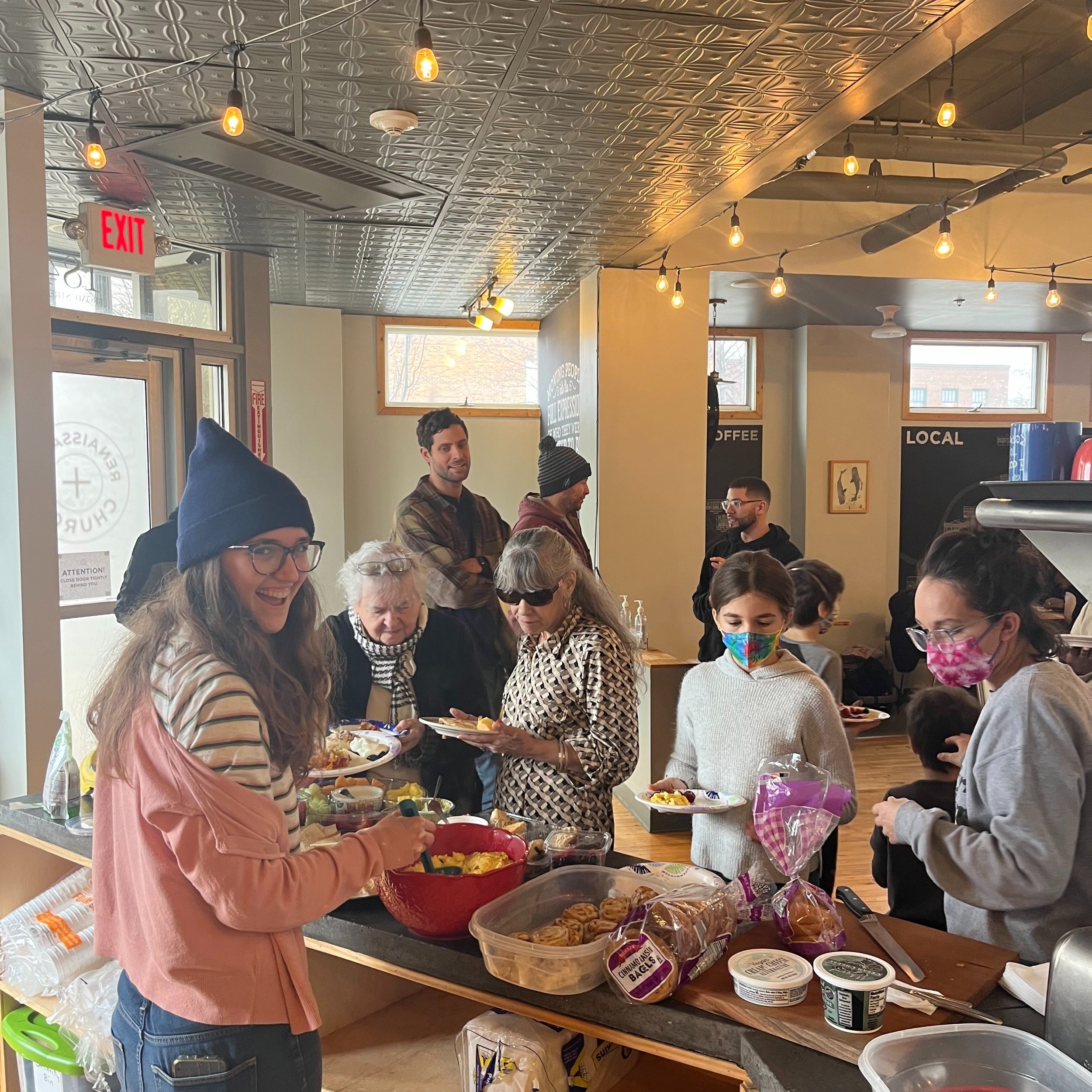SUNDAY HYBRID MODEL
Ren Church was founded in 2003 and has always had a mix of “big” gatherings and small gatherings. So why are we moving to this more dramatic hybrid model? Well, we’ve noticed through the years that most of our energies have gone into the “big Sunday event”—which is important, but—not as much goes into the smaller church expressions. In fact, many don’t even participate in small communities. The average Christian just comes to the big Sunday event. That's pretty much the new norm—and that's not enough! That's not God’s full design for his church; that's not enough to fulfill the 50+ “one another” verses in the New Testament!
During the recent pandemic, many Christians had this epiphany that passively attending church once a week is not enough. When the big Sunday production had to be put on pause, many disappeared from the church community. Pastors realized that many people in the church didn’t really know each other. So we are passionate about structuring things in a way to foster the deeper relationships needed to produce real disciples. A shallow church experience will produce shallow Christians. And we don’t want that. It’s always been our mission to move people into the full expression of who God created them to be.
In a big gathering only the pastor and a few others tend to contribute. In a small gathering everyone contributes; no one personality dominates; people cultivate and use their gifts; hospitality is more natural and personal. Another strength of smaller gatherings is that the older teach the younger. Deep discipleship always happens best in the context of smaller gatherings. Think of how Jesus spent most of his time with a small handful of disciples. And, it's a lot harder for people to fall away when communities are small and tight. That’s why we are doing this. We invite you to join us!
SUNDAY GATHERINGS
1ST + 3RD SUNDAYS
All-Church Gatherings
Morning Prayer | 9 - 9:30 am
All-Church Gatherings | 10 am
184 Broad St, Providence, RI 02903
Can’t make it in person? Listen live on 1st and 3rd Sundays:
On the 1st and 3rd Sundays of the month the entire church gathers for a vibrant worship time and an in-depth teaching from God’s Word. The morning service is held in our second floor sanctuary overlooking the city of Providence and runs from 10 am till about 11:30.
We have an available parking lot behind our building (off Stewart St). If full, park in the Crossroads parking lot across the way.
2nd + 4th SUNDAYS
On the 2nd and 4th Sundays of the month, the Ren community meets in five different neighborhood gatherings across Rhode Island: East Bay (Rumford), College Hill (Providence), Southside (Providence), Cranston, and West Bay (Warwick). These neighborhood gatherings are a medley of singing, biblical storytelling, discussion group sharing, and eating a meal together and are intentionally intergenerational. Check out below the five locations that meet on 2nd and 4th Sundays.
East Bay
Neighborhood Gathering
Rumford Towers
95 Newman Ave, Rumford, RI
10 AM - NOON
The East Bay Neighborhood Gathering meets in a community room at the Rumford Towers on 95 Newman Ave, Rumford, RI at 10 AM on 2nd and 4th Sundays. Entrance is the main door to the North Tower, and someone will be at the door to let it open for you. There is plenty of free parking.
College Hill Neighborhood Gathering
Vartan Gregorian Elementary School
455 Wickenden St, Providence, RI
10 AM - NOON
The College Hill Neighborhood Gathering meets at the Vartan Gregorian Elementary School (455 Wickendon St, Providence) at 10 AM. To reach the gathering, enter through the doors at the west entrance (closest to India Point Park). There is a small parking lot to the left of the doors.
Southside Neighborhood Gathering
184 Broad St, Providence, RI
10 AM - NOON
Residing in the entrypoint of the South Providence neighborhood, the Southside Neighborhood Gathering meets on the first floor cafe of 184 Broad St at 10 AM on 2nd + 4th Sundays of the month, the same building of our all-church gatherings on 1st + 3rd Sundays. Enter through the front door; free parking is behind the building.
Cranston
Neighborhood Gathering
CLCF Building
970 Pontiac Ave, Cranston, RI
10:30 AM - 12:30 PM
The Cranston Neighborhood Gathering meets inside the CLCF Building at 970 Pontiac Ave, Cranston, RI at 10:30 AM on the 2nd and 4th Sundays. Enter through the front door, and free parking is in front of the entrance.
West Bay Neighborhood Gathering
358 Warwick Neck Ave, Warwick, RI
4 - 6 PM
The West Bay Neighborhood Gathering meets in a hexagonal-shaped building at 358 Warwick Neck Ave, Warwick, RI at 4PM on the 2nd and 4th Sundays. The building is behind an old blue church building called “Heritage Christian Fellowship,” and there is a large parking lot. Enter through the doors by the parking lot.
5th Sundays
When there is a 5th Sunday of the month, the entire Ren Church community gathers for a meal. These are to give us more time to build community than we normally would with a Sunday service. We’ve met in parks, schools, and different set-ups of the 184 Broad St location; the location and time tends to switch up on 5th Sundays, so be sure to check the homepage for updates when a 5th Sunday comes up.
FAQ’s on Neighborhood Gatherings
What does the typical gathering look like?
Each of our locations will be a little different, because there will be different mixes of people. But there are certain things that you can expect at each gathering. We usually start our gatherings with singing. We created a tiny songbook with about 30 simple songs so that everyone can get familiar with the music and parents can even teach their kids the songs at home. Because the gatherings are small, it's a lot easier to create space in between songs for any one present to lead out in a prayer or to share a verse of Scripture. The beautiful thing about gathering small is that everybody can contribute.
After the singing, someone tells one of the many stories from the Bible. Part of the reason we focus on biblical stories is because everyone loves stories. They tend to engage all generations. After the storytelling, there will be some ways to respond for both adults and kids to process the story and apply it to life. Note: Children will be included in everything as much as possible. However, we will have opportunities for kids to play. There will be play spaces for some of the really little kids who just need that space.
The last component of the small gathering is that we'll share a meal together. Breaking bread was a huge part of the early church. Eating a meal together is a deeply spiritual thing. Jesus spent a lot of time with His disciples doing this. Good things happen over the table. Important things are shared. People open up their lives and get to know each other. They discover needs. The meal is a powerful thing.
Is the Word of God preached at the neighborhood gathering?
It’s not merely a smaller version of what we do when we're all together, with one person preaching for 40-50 minutes. It’s not like that. The Word, however, will be central. It's just handled in a different way. We have to understand that preaching and teaching and storytelling and discussion and reading and all the different ways we process and apply the Word of God are good. In fact, those who are in education know that variety in learning is important. Those who are in a classroom with kids, all day long, every single day know you can’t just lecture to them for seven hours, right? You need to have them in groups. You need to have them doing stuff. You need to have them sharing and collaborating. There needs to be interaction. There are some kids that love to process in that way. All of these different methods are important. In fact, some people really struggle with listening to a lecture style form of communication. There's so much more that could be said on all this but the answer is a resounding “yes”—the Word will be central in these small neighborhood gatherings.
Are they just twice a month?
Yes and no. In one sense, yes, the neighborhood gatherings are twice a month on the second and fourth Sundays, but each small community has a variety of other opportunities to gather as well. For example, maybe just the men or just the women get together or somebody hosts a barbecue at their house. Or, maybe the whole group goes apple picking on a Saturday or has an extended worship block from nine to midnight on a Friday. Each small community is free to do whatever extra things they feel would work to grow together spiritually. And certainly there will be mission opportunities. So, yes, the main neighborhood gatherings are twice a month, but there are many other opportunities that happen organically.
What about programming for children?
One of the common concerns that parents have regarding small church expressions is that there’s no special programming for children. To be honest, sometimes parents just want 90 minutes of childcare away from their kids so they can receive from God. That’s understandable. Children can be exhausting especially if they are hanging on your hip from morning till night.
But—and this is a very big but—the statistics show that most children depart from church life once they become adults. Traditional kids programming is not working, or at least we could say, isn’t enough. Separating out the children from the adults at church may not be the best way to disciple children. The Bible nowhere encourages us to create this dichotomy. In fact, there’s a lot more biblical support that families should worship, pray, learn, and do mission together. So we are determined to explore ways to do this with excellence. We want Ren to be a church that children and youth absolutely love because they are deeply known, loved, and involved. We still have some programming for children on the 1st and 3rd Sunday big gatherings, but in the neighborhood gatherings we will all be together as much as possible.
Do I have to bring food?
The meal for the neighborhood gatherings twice a month is potluck-style. For those not familiar with the term “potluck” it just means that everyone brings something to contribute. Many small communities usually decide on a theme for a particular Sunday, like salads, or Mexican, or Italian, or whatever. And each family or individual brings one item to contribute. All this is usually coordinated in advance through email or some other form of communication. That said, it’s absolutely okay to not bring food. Sometimes life gets so busy that the best you can do is get yourself there. That’s fine. Another option is to just pick something simple up from the market. A potluck is not a contest to see who can make the most elaborate meal. The whole point of a potluck is that if everyone brings one item—it is easy, and it’s a feast!
What happens when they grow?
As small communities spend more and more time together, the Lord will fuse hearts together in love. A sense of camaraderie will develop. It will become like a little family. Much time and energy will be invested to bring a small community to a place of intimacy and depth. While all this is part of the aim and is very beautiful—it makes the idea of planting new works a great challenge. After becoming a tight thing, people tend to become attached and don’t want to give it up. That’s why it’s essential that planting is deeply embedded into the DNA of each small community.
Why plant a new work? There are a few reasons. If the meeting space is small, we may not be able to fit more than 30-40. Once a community gets beyond 30 and starts growing to 50 and beyond, the pastoral duties may become more than unpaid elders and point leaders can handle. But the most important reason to plant a new work is to reach new people!
When a community grows to about 30 consistently, they will set apart at least a dozen people to be sent out to a different location to start something new. This new work becomes, sort of, a “daughter” work. The sending community will be responsible to “mother” the new work and nurture it until it stands firm. For this reason, we may have the new plants gather on Sunday evenings so that the mother work can occasionally join the daughter work, and the daughter work folks can join the mother work folks. We are still working all this out and seeking God’s wisdom.
Lastly, in order for a new work to be healthy, the core team of 12+ planters must be well prepared. In some cases, those sent out might be the newer people. In other cases, we might send the original members. Or it could be a mix. Another idea is to partner with another small community to plant a new work (each small community sends 6-8 people). We are committed to staying fluid and allowing this movement to grow how God wants it to grow.
Why don't we meet in homes?
Over the last 20 years, we have had a variety of small community gatherings in homes. It doesn’t cost anything to meet in a home. And it can also be very intimate. We will continue to use our homes at times to gather. However, the aim for the neighborhood gatherings is to establish a constellation of neutral spaces that are really accessible to all. Especially in New England, people are a little hesitant to step into somebody's home if they don't know the person well, right? So the ideal space for a neighborhood gathering is one that is neutral, familiar and inviting. Most of the spaces that we're using are rented for two or three hours at a time. But the goal long term would be to establish mission spaces that we can use anytime. These spaces don't have to be huge because we're really talking about less than 50 people gathering. They can be small spaces. Ideally, we are aiming to make them financially self-sustaining by renting the space to other groups.
Should I attend the one closest to me?
One of the reasons we have neighborhood gatherings scattered around greater Providence is because the Ren community lives all over. The idea is to be in a small community with people who live relatively close to one another so it's easier to serve one another. It’s just easier to do spontaneous things to support each other if you live close to each other. So we encourage you to be in the small community that's closest to you. That said, you don't have to choose the neighborhood gathering nearest to you. You might decide to be part of one that's a little further away because the time is better or because you have really good friends you want to be with, and it's worth the extra drive. You can also certainly be in more than one small community. That's absolutely fine as well.
Are these missional communities?
Absolutely they are. These are not meant to be insular groups in a little bubble. The missional aim is to find ways together to serve people who live in these various geographic areas. A small community can host gatherings of all different types to invite people to, and they can go out and serve and help neighbors. Again, we're not dictating as staff or elders what each small community should do, because—every neighborhood is different. We're just giving them the freedom to do what they feel led to do. The goal is to create opportunities with varying degrees of gospel potency to serve people who aren’t yet ready to step into a traditional church space.
What if I'm not a Christian yet?
For somebody who's not yet a Christian, the absolute best way to process the Christian faith is to be in a spiritually-rich smaller setting. In a small community you can ask questions, and you can get answers. You can process things. In a large setting you can listen to the gospel message. But in the smaller setting you can get a close-up view of how the gospel message is appropriated in people’s lives.
Probably about half of the members at Renaissance church didn't become followers of Jesus until later in life. We understand how delicate it is to move from unbelief to belief. It takes time, and there's a process that requires patience. It’s ideal to work out your struggles with faith in a smaller setting, rather than just attending big church events. We believe a mix of big and small is ideal. At the larger gatherings you’ll hear the Word expounded by pastors who have devoted their lives to studying and communicating God’s Word. Don’t miss that. But in the smaller gatherings we help each other figure out how to live out the Word. We encourage both!














